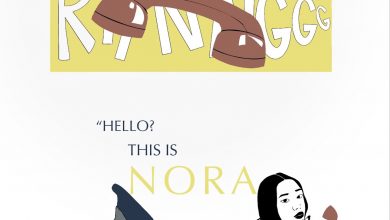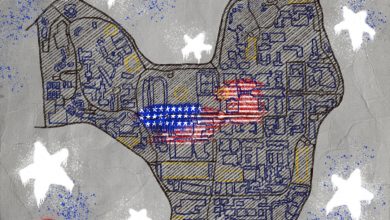I was Co-Dependent Before it was Cool: Dysfunctional love and performative identity in Indie pop
Admit it. When you endured the pangs of a broken heart, you sought comfort in Adele’s “21.” In the world of alternative indie pop, however, songstresses treat broken hearts differently. A feminine identity crisis curiously seems to be the result of rejection and unrequited love. In their 2012 albums, indie pop queens Lana Del Rey and Marina and the Diamonds adopted the roles of cliché female tropes such as the beguiling Lolita or femme fatale as a means to allay the pain of feeling unloved and thus gain erotic power. These women also illuminate a frightening portrait of dysfunctional, co-dependent love not normally seen in Top 40 music.
In “Born to Die,” Lana creates an idealized world of a tragic Old Hollywood romance in which she plays a virginal innocent who has fallen prey to a jaded, troubled James Dean type. Lana’s vintage, yet inherently cliché love story carries problematic implications for feminism and masks a tortured tale of an obsessive unrequited love. Indeed, Lana Del Rey poses a serious feminist problem by romanticizing co-dependent love. In her hypnotic “Video Games,” Lana sings of love for a man who despite all her efforts, rather“go play a video game.” The genius of “Video Games” lies in its realistic depictions of a banal modern young love. However, this genius is undermined by an indulgence in a fantasy of female submission. Lyrics such as “I’m in his favorite sun dress/ watching me get undressed..put his favorite perfume on” suggest Lana’s subjugation to a man who simply does not love her back. Lana, obsessed with her love object, is happily resigned to being unloved. Ultimately, Lana is painting a dangerous picture of an unhealthy co-dependent love in which she is being consumed by her admiration for a narcissist. Indeed, in her video for the song “Blue Jeans,” Lana is killed by a love object that turns into an alligator in the posh pool of Chateau Marmont. In other words, she is literally dying of love for this man.
Lana responds to this rejection by creating the personas of an American gold digger and ruinous Lolita, characters that counter the exposed vulnerability of “Video Games.” Lana litters her album with references to Lolita and boasts about manipulating older men for their money. Anti-feminist in nature, these personas tout a regressive financial dependency and vapid materialism. In “Off to the Races,” Lana seductively croons “Light of my life/ fire of my loins/give me them gold coins.” Lana appears to be suffering from a split personality disorder in Born to Die. She is at once a slave to love and a gold-digging femme fatale. But, this dichotomy reveals a problematic construction of femininity that results from failed love. Lana performs these roles to allay the jolt of romantic disillusionment. Yet, Lana ironically performs cliché and misogynistic roles in a sphere of music that is supposedly cutting-edge and boasts avante-garde ideas about gender and music. Leland Jasperse, a third-year English student, remarked upon this paradox by saying that “Lana Del Rey channels a sense of alternativeness, while still residing in female tropes. She is creating a superficial persona that would appeal to an alternative audience.”

In the concept album “Electra Heart,” Marina Diamandis’s performance is more explicit and deliberate. Her “world of Electra Heart” parodies Lana’s vintage Hollywood fantasy. She plays four female archetypes who, despite their similarities, are all variations of heartless and egotistical femme fatales. These four archetypes are Teen Idle, Primadonna, Homewrecker and Su-Barbie-A. In her press release in April 2012, Marina explained her eccentric narrative to Telegraph.co.uk by stating “It’s an ode to dysfunctional love..I guess it was a way of dealing with the embarrassment that, for the first time in my life, I got ‘played.’ Rejection is a universally embarrassing topic and Electra Heart is my response to that.”
Once humiliated by rejection, Marina fantasizes about breaking “a million hearts just for fun” in the song “Homewrecker” and having a man “wrapped around her finger” in “Primadonna.”Indeed, the album opens with the delicious glam rock song “Bubble Gum Bitch” in which Marina lives vicariously through a vicious fictional pin-up who carelessly “pops” hearts. She turns the tables of classic courting behavior and becomes the powerful pursuer. Aleen Mayelian, a fourth-year political science student, stated that “the album is about individuality and power. The character of Electra Heart is Marina’s way of expressing power over men because she was vulnerable at a point in the past. She adopts the role of a vixen to regain power and she puts her own unique spin on an otherwise cliché character.”
Despite the seemingly positive implications of the kind of gender performance that Lana and Marina depict in their albums, these roles are simply unhealthy reactions to a harmful co-dependent love. Their performances may be liberatory and empowering, but they also inevitably mask insecurities and obsessive love. Moreover, love should not be a game where women must battle for respect and love. “Born to Die” and “Electra Heart” are my favorite albums of 2012, but they are in danger of reducing modern love to a “play” in which women cannot simply play themselves, but must adopt roles to desperately win the admiration of men who simply are not deserving of their affection.





